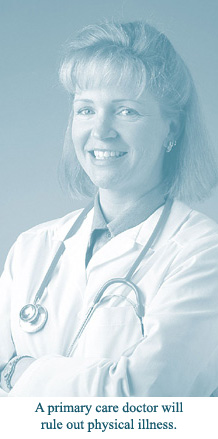Where To Go For Help
Once the decision to seek professional help has been made, the
following are places you can go.
 |
Your personal or primary care
doctor (to rule out any physical illness first) |
 |
Your confidential Employee
Assistance Program (EAP) |
 |
Your Student Counseling
Center. (Most colleges provide free counseling services for
their students. Some limit the number of sessions. After
that number is reached, students may still need to locate a
private therapist for continued treatment.) |
 |
Family members, friends, or
co-workers |
 |
Your religious advisor (i.e.,
priest, rabbi, minister) |
 |
Your County Mental Health
Department (listed in the white pages section under
Government Offices). Contacting them is especially important
if you have no health insurance. |
 |
Professional organizations,
such as your state’s psychiatric, psychological counseling,
or social work associations |
 |
Organizations listed in the
yellow pages under “Mental Health Services” or “Hospitals”
(Ask for their departments of psychiatry, psychology, social
work, or their crisis center.) |
 |
Community agencies, such as
Catholic Social Services, Jewish Vocational Services, Family
Services Agency, etc. |
 |
Crisis Intervention Centers –
especially if you need help immediately. Check your local
phone book under “Crisis,” “Suicide Prevention,” “Drug
Abuse,” “Rape,” “Domestic Violence,” or “Hospitals.” |
 |
Self-help groups and local
campus or national organizations for specific disorders.
Examples include: Alcoholics Anonymous (AA), Agoraphobics in
Motion (AIM), National Association of Anorexia Nervosa and
Associated Disorders (ANAD), Narcotics Anonymous (NA),
Overeaters Anonymous (OA), Gamblers Anonymous (GA). See “National Resources"
for listings. |
|
 |